
Neal Paul Hefti was an American jazz trumpeter, composer, and arranger. He wrote music for The Odd Couple movie and TV series and for the Batman TV series.

Harry "Sweets" Edison was an American jazz trumpeter and a member of the Count Basie Orchestra. His most important contribution was as a Hollywood studio musician, whose muted trumpet can be heard backing singers, most notably Frank Sinatra.

Bert Kaempfert was a German orchestra leader, multi-instrumentalist, music producer, arranger, and composer. He made easy listening and jazz-oriented records and wrote the music for a number of well-known songs, including "Strangers in the Night", “Danke Schoen” and "Moon Over Naples".

Nelson Smock Riddle Jr. was an American arranger, composer, bandleader and orchestrator whose career stretched from the late 1940s to the mid-1980s. He worked with many vocalists at Capitol Records, including Frank Sinatra, Ella Fitzgerald, Nat King Cole, Judy Garland, Dean Martin, Peggy Lee, Johnny Mathis, Rosemary Clooney and Keely Smith. He scored and arranged music for many films and television shows, earning an Academy Award and three Grammy Awards. He found commercial and critical success with a new generation in the 1980s, in a trio of Platinum albums with Linda Ronstadt.
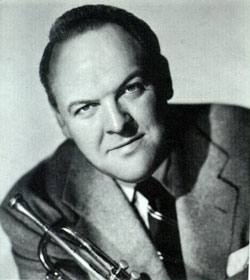
Edward William May Jr. was an American composer, arranger and trumpeter. He composed film and television music for The Green Hornet (1966), The Mod Squad (1968), Batman, and Naked City (1960). He collaborated on films such as Pennies from Heaven (1981), and orchestrated Cocoon, and Cocoon: The Return, among others.
Gordon Hill Jenkins was an American arranger, composer, and pianist who was influential in popular music in the 1940s and 1950s. Jenkins worked with The Andrews Sisters, Johnny Cash, The Weavers, Frank Sinatra, Louis Armstrong, Judy Garland, Nat King Cole, Billie Holiday, Harry Nilsson, Peggy Lee and Ella Fitzgerald.
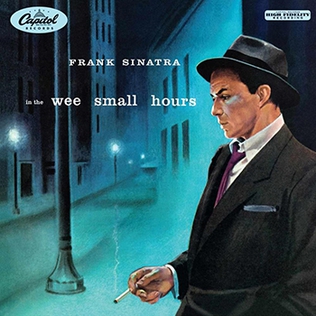
In the Wee Small Hours is the ninth studio album by American vocalist Frank Sinatra. It was released in April 1955 by Capitol and produced by Voyle Gilmore with arrangements by Nelson Riddle. The album's songs deal with themes such as introspection, melancholy, lost love, failed relationships, depression and night life. The cover artwork reflects these themes, portraying Sinatra alone at night on an eerie and deserted city street awash in blue-tinged street lights.
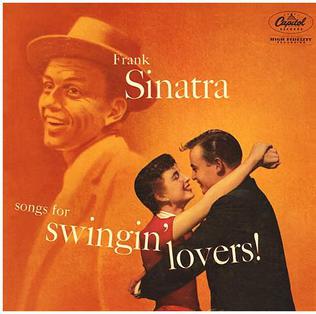
Songs for Swingin' Lovers! is the tenth studio album by American singer Frank Sinatra, and his fourth for Capitol Records. It was arranged by Nelson Riddle and released in March 1956 on LP and January 1987 on CD. It was the first album ever to top the UK Albums Chart.

Songs for Young Lovers is the seventh studio album by Frank Sinatra and his first on Capitol Records. It was issued as an 8-song, 10" album and as a 45rpm EP set, but it was the first Sinatra "album" not to have a 78rpm multi-disc-album release. In 2002, it was one of 50 recordings chosen that year by the Library of Congress to be added to the National Recording Registry.

A Man and His Music is a 1965 double album by Frank Sinatra. It provides a brief retrospective of Sinatra's musical career. The album won the 1967 Grammy Award for Album of the Year.
"They Can't Take That Away from Me" is a 1937 popular song with music by George Gershwin and lyrics by Ira Gershwin. It was introduced by Fred Astaire in the 1937 film Shall We Dance and gained huge success.
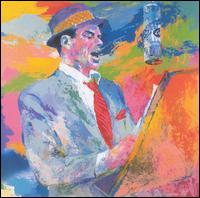
Duets is an album by American singer Frank Sinatra, released in 1993. Recorded near the end of Sinatra's career, it consists of electronically assembled duets between Sinatra and younger singers from various genres. The album was a commercial success, debuting at No. 2 on the Billboard albums chart, reaching No. 5 in the UK, and selling over 3 million copies in the US. It is the only Sinatra album to date to achieve triple platinum certification.

The Count Basie Orchestra is a 16- to 18-piece big band, one of the most prominent jazz performing groups of the swing era, founded by Count Basie in 1935 and recording regularly from 1936. Despite a brief disbandment at the beginning of the 1950s, the band survived long past the big band era itself and the death of Basie in 1984. It continues under the direction of trumpeter Scotty Barnhart.
"Too Marvelous for Words" is a popular song written in 1937. Johnny Mercer wrote the lyrics for music composed by Richard Whiting. It was introduced by Wini Shaw and Ross Alexander in the 1937 Warner Brothers film Ready, Willing, and Able, as well as used for a production number in a musical revue on Broadway. The song has become a pop and jazz standard and has been recorded by many artists.

"Love Is Here to Stay" is a popular song and jazz standard composed by George Gershwin with lyrics by Ira Gershwin for the movie The Goldwyn Follies (1938).
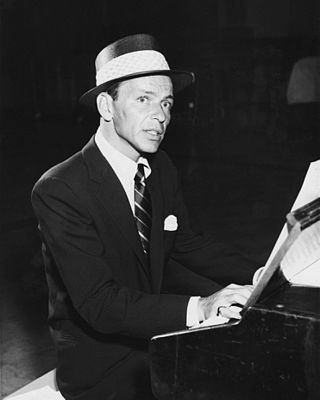
Frank Sinatra's musical career began in the swing era in 1935, and ended in 1995, although he did briefly retire in 1971, before returning to music in 1973. Sinatra is one of the most influential music artists of the 20th century, and has sold 150 million records worldwide, making him one of the best-selling music artists of all-time. Rock critic Robert Christgau called Sinatra "the greatest singer of the 20th century". In addition to his music career, Sinatra was also a successful film actor, having won the Academy Award for Best Supporting Actor for his role as Private Angelo Maggio in From Here to Eternity (1953).
Vincent Ned DeRosa was an American hornist who served as a studio musician for Hollywood soundtracks and other recordings from 1935 until his retirement in 2008. Because his career spanned over 70 years, during which he played on many film and television soundtracks and as a sideman on studio albums, he is considered to be one of the most recorded brass players of all time. He set "impeccably high standards" for the horn, and became the first horn for Henry Mancini, Lalo Schifrin, Alfred Newman, and John Williams, among others, with Williams calling him "one of the greatest instrumentalists of his generation." DeRosa contributed to many of the most acclaimed albums of the 20th century, including some of the biggest-selling albums by artists as diverse as Frank Sinatra, Barry Manilow, Frank Zappa, Boz Scaggs, Ella Fitzgerald, Harry Nilsson, Stan Kenton, Henry Mancini, The Monkees, Sammy Davis Jr., and Mel Tormé.
The following is the discography for big band and traditional pop arranger Nelson Riddle (1921–1985).

Sinatra: Best of the Best is a 2011 double compilation album by American singer Frank Sinatra.
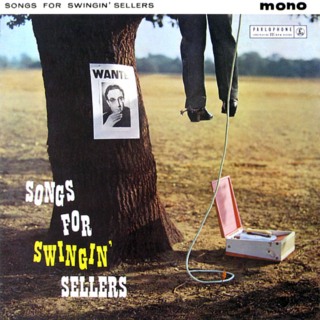
Songs for Swingin' Sellers is the second studio album by the English actor, comedian and singer Peter Sellers. Released on EMI's Parlophone label in December 1959, the album was produced by George Martin with musical direction from Ron Goodwin and features a series of comic sketches showcasing Sellers' satirical humour and mimicry. The album was titled as a play on Frank Sinatra's Songs for Swingin' Lovers! and much of its contents pointedly satirises popular culture, with musical parodies of Sinatra and Lonnie Donegan among the tracks. Sellers plays a variety of roles alongside contributions from the comic character actress Irene Handl and the singer Matt Monro. A critical and commercial success, the album reached number three in the UK Albums Chart and Martin's elaborate production has been cited as an artistic forerunner to his work with the Beatles.















